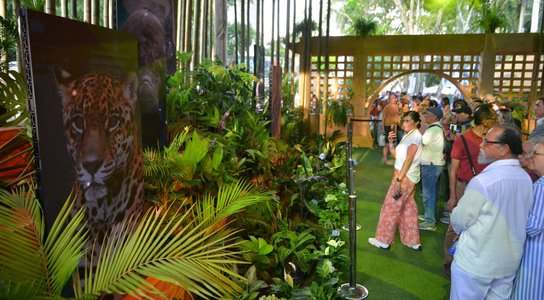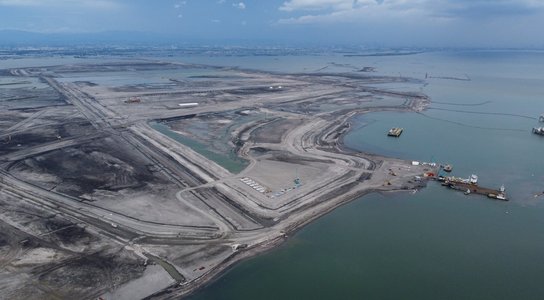Key findings
- Industrial rubber plantations across west and central Africa linked to almost 520km2 of deforestation since 2000 – an area 16 times the size of Brussels – suggests new Global Witness analysis.
- The EU imports over 30% of all rubber shipped by Africa’s top producers, yet rubber is excluded from the bloc’s recently proposed anti-deforestation legislation.
- Rubber, not palm oil, appears to be the biggest export-driven threat to west and central Africa’s climate-critical tropical forests. The EU’s rubber imports from leading African producers are worth more than 12 times more than its imports of palm oil from the region
- Forest communities across the region face increasing pressure on land and livelihoods as a result of rubber plantations, some of which were reportedly established without their consent. In some cases, violent repression of community protests against rubber companies by local security services have been reported.
- Almost all plantations linked to deforestation are currently owned by just three multinational companies, which together have made deals worth billions of euros with European banks such as Rabobank, BNP Paribas, Deutsche Bank and Barclays.
- Download a PDF version of this article (871.3 KB), pdf
Sitting beside her breeze-block hut in the village of Bitye in Cameroon’s forested east, the old woman tells Global Witness why she has placed a curse on the country’s biggest rubber company.
“If they don’t change their ways they will see apparitions there in the bush, they will see men who are 15 metres tall. It’s our ancestors who left us those forests.”
Behind these words are serious grievances. Less and less land to farm on, and disillusionment about promises by the company – Sud-Cameroun Hévéa – to deliver schools, clinics and wells.
Such complaints echo those from communities living next to rubber plantations across much of Africa where the expansion of rubber has created increasing pressure on land and a range of conflicts.
And a new analysis by Global Witness now suggests that rubber, even more than palm oil, is the agricultural export that poses the biggest threat to the tropical forests of central and west Africa. African forests are critical to the fight against the climate emergency, absorbing three times more carbon each year than the UK emitted in 2019 according to one study.
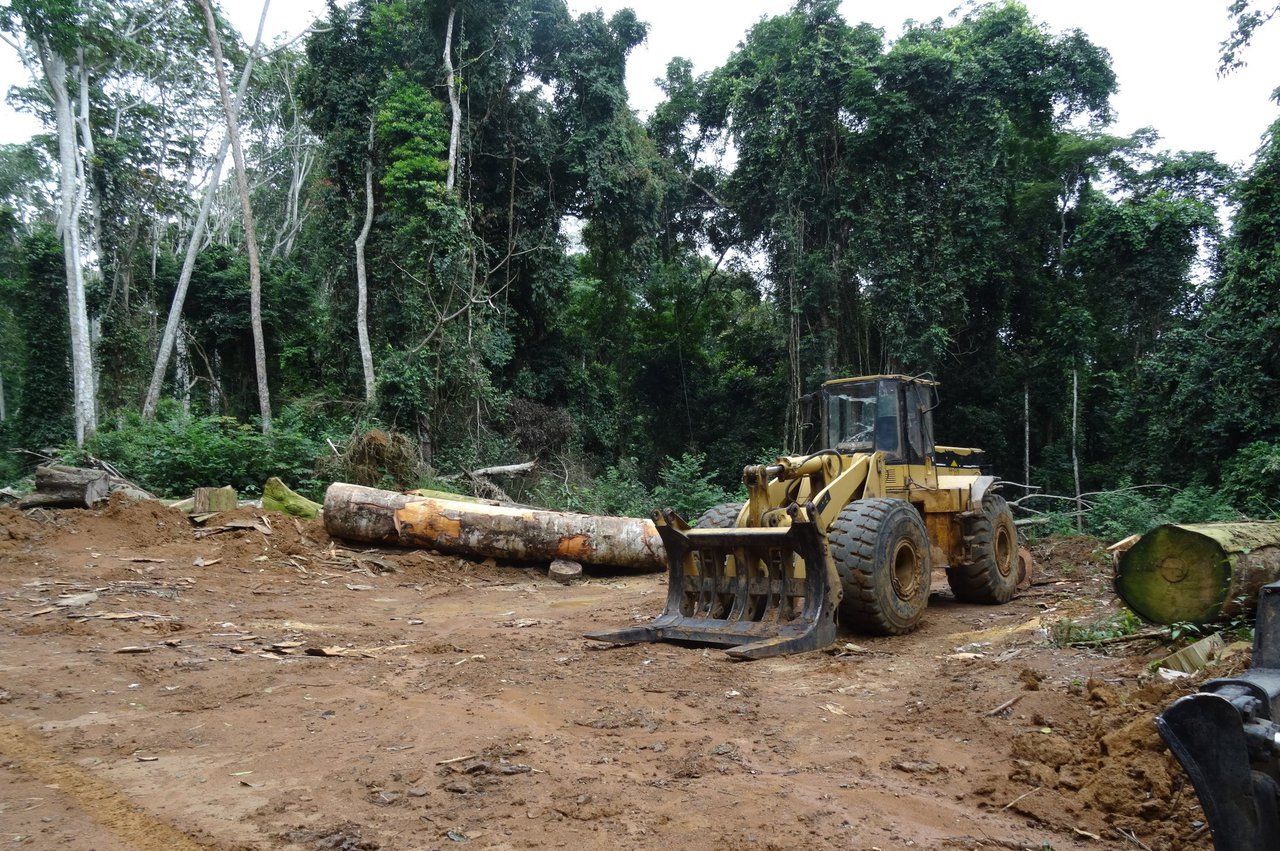
Forest is cleared to make way for a rubber plantation in Cameroon. Nchemty Metimi Ozangashu / Greenpeace
Our investigation used Landsat and Sentinel satellite data on established agribusiness concessions across Cameroon, Gabon, Liberia, Nigeria, Cote d’Ivoire and Ghana – countries that have been at the forefront of agribusiness expansion in Africa. Using a combination of automated detection and visual analysis of satellite images, we aimed to find how much forest had been converted to rubber cultivation over a 20-year period (2000-2020).
We found that industrial rubber cultivation across west and central Africa appears to be responsible for almost 520km2 of deforestation since 2000, an area 16 times the size of Brussels. The ecosystems impacted by rubber range from forest reserves in Nigeria and Ghana to the old growth equatorial forests of Cameroon and Gabon. Meanwhile the value of rubber exports from this region to the EU is over 12 times that of palm oil, a commodity widely associated with deforestation in west and central Africa.
Yet astonishingly, landmark EU and UK laws aiming to curb agricultural imports that fuel deforestation may yet fail to protect Africa’s forests by excluding rubber from the legislation. Plans to omit rubber from the laws would mean the trade flow with arguably the most devastating impact on the rainforest regions of west and central Africa will remain unregulated.
Standing in front of delegates at Glasgow’s COP26 last November, European Commission President Ursula von Leyen declared: “European voters and consumers … no longer want to buy products that are responsible for deforestation or forest degradation.
“This is why we will soon propose a regulation to tackle EU-driven global deforestation.
“Commodities and products placed on our market should not lead to deforestation.”
But the Commissioner’s promise could be undermined. After a concerted lobbying effort by the tyre industry, the Commission decided that rubber would be removed from the list of commodities covered by the new laws.
As things currently stand, only palm oil, soy, beef, wood, coffee and cocoa - and some products made with them - will be covered by the EU regulation according to the proposal from the European Commission. This decision has been met with dismay from environmental activists in the forested countries of central and west Africa, who point not only to deforestation but to the impacts on communities who are losing access to land. There is still an opportunity that rubber could be added to the list before the final regulation is approved by EU decision-makers.
The UK government is due to bring forward secondary regulation specifying the commodities covered by the deforestation provision in the recently adopted Environment Act. Options published by the UK government as part of a consultation earlier this year raise the prospect that rubber might not be covered by the law in the immediate term. The UK, like other European countries, relies heavily on rubber imports and consumes an estimated 50 million tyres each year.
A closer look at how European demand for rubber drives deforestation and piles pressure on rural communities across Africa underlines the need for its inclusion in new deforestation laws.
Tyre industry lobby gets into gear
As EU proposals to regulate commodities linked to deforestation have taken shape, rubber industry lobbyists have been quick to voice opposition. The European Tyre & Rubber Manufacturers Association (ETRMA) represents companies like Michelin, Pirelli and Goodyear in Brussels policy-making circles. The body has poured cold water on the idea that European rubber importers should face legal obligations to remove deforestation from their supply chains. In a December 2020 response to the European Commission, the ETRMA said the proposed deforestation rules were “not … feasible for the natural rubber value chain,” arguing they “would have no or little effect on halting deforestation, but would bear severe consequences on the European economy”.
The ETRMA’s claim that EU rubber had relatively little impact on deforestation was based on a 2019 study by Swedish academics, which claimed that rubber, sugar, coffee and cacao made up less than 5% of the EU’s “imported deforestation”. But as green activists wasted little time in pointing out, this study had only looked at the EU’s imports of raw rubber, and not focused on the EU’s huge consumption of manufactured rubber products, most notably tyres.
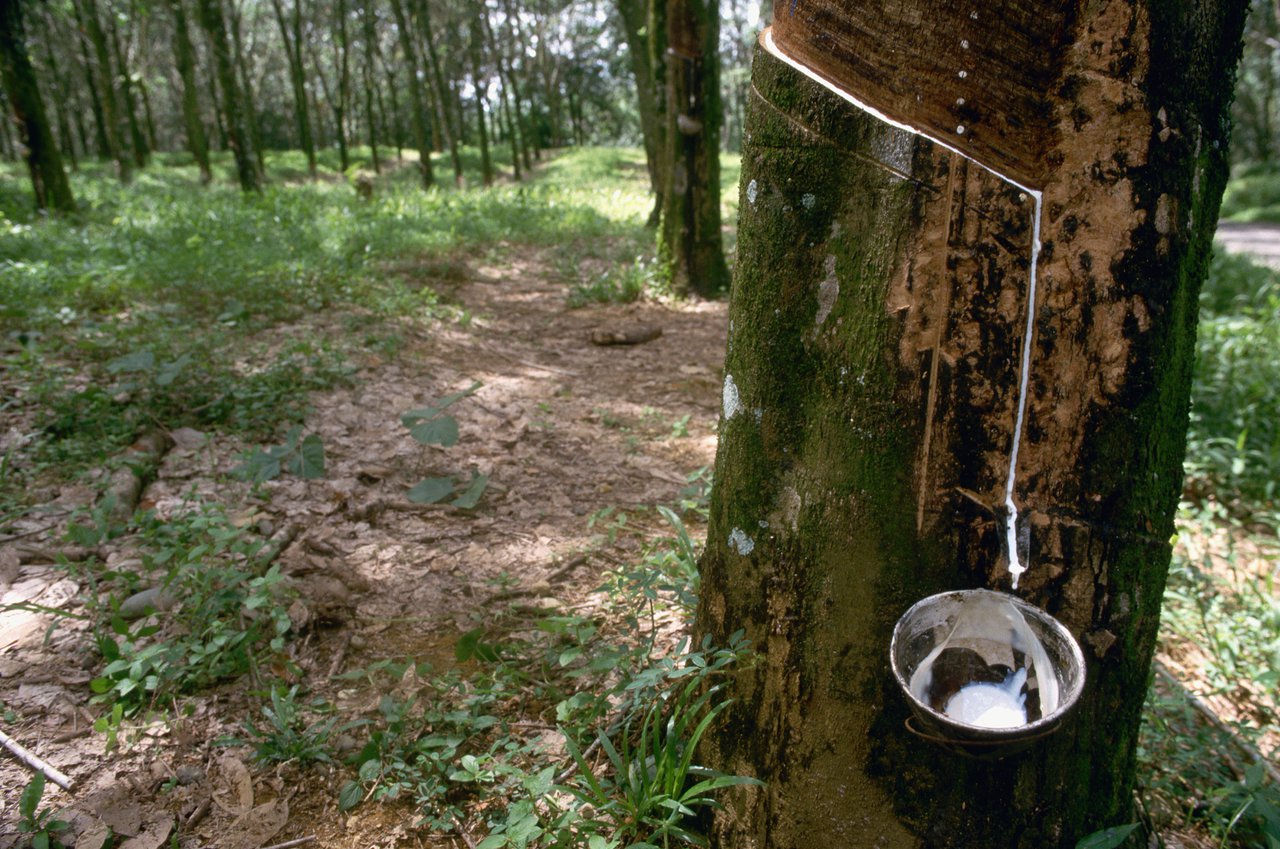
Rubber trees have replaced swathes of natural forest in parts of Africa. Owen Franken via Getty
Forests flattened
New analysis by Global Witness now indicates almost 52,000 hectares of forest in central and west Africa have been flattened to make way for internationally-owned rubber plantations since 2000. This is an area 16 times larger than the city of Brussels. The ecosystems lost range from forest reserves in west Africa to the old-growth equatorial forests of the Congo Basin. These plantations are controlled by a handful of multinational firms whose business is largely dependent on their links with Europe-based banks and with international tyre companies such as Michelin.
As our analysis only focused on large-scale plantation and not only smallholders, the true amount of deforestation in Africa linked to the crop is likely to be far higher.
Global Witness mapped 40 industrial rubber plantations across six African rubber-producing states: Cameroon, Gabon, Nigeria, Cote d’Ivoire, Ghana and Liberia. Using an artificial intelligence algorithm, coupled with visual analysis of Landsat and Sentinel satellite imagery, we were able to identify the areas within those plantations that were converted from natural forests to rubber between 2000 and 2020.
Almost all plantations where deforestation was found to have taken place are currently owned by just three international companies: the Singapore-based firms Olam and Halcyon Agri, and the French and Belgian-owned Socfin, which is listed on the Luxembourg stock exchange. Halcyon Agri and Socfin in particular have been suppliers to European tyre giants such as Michelin and Continental.
Global Witness wrote to these companies prior to publication of this report. Olam told us that their main rubber plantation in Bitam, Gabon consists of “10,855 hectares planted area and 24,584 hectares … [of] permanently protected forest and wetlands.” They added that the government of Gabon – a partner on the project – chose its location, an area of “old logging concessions, secondary forests, and degraded areas and [the project] was developed in line with a process to carefully balance Gabon’s development needs with the imperative to conserve the country’s unique landscapes.” The company added that it is committed to FPIC principles and works with local villages on “income generating activities, …. education, healthcare and improved access to water.”
Halcyon Agri said that while 2,300 hectares of forest had been cleared since they acquired the Sudcam plantation in Cameroon, they believed that this forest had already been degraded by logging prior to their acquisition of the land. They said “no clearing has … been done [since 2018] and we have had a No Deforestation policy in Cameroon since December 2018.… Our land in Cameroon is now, and will remain, 65% unplanted. This includes 25,000 hectares that we are currently in the process of protecting as a community forest.” Halcyon Agri also strongly refuted criticism of its record on delivering clinics, schools and wells for communities near the Sudcam plantation. The company’s full response can be read here.
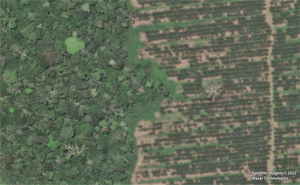
A rubber plantation encroaches into the rainforest, Cameroon. Maxar Technologies.
Socfin stated that they that they introduced a zero deforestation commitment in 2016 and any deforestation on their plantations would have predated the introduction of this policy. The company told us that “prior to establishing a zero-deforestation policy some rubber extensions have been done by clearing degraded natural forest areas between 2000 and 2016; this represents 315 ha [hectares] at Safacam, 1,089 ha at PSG and 3,486 ha at Okomu, a total of 4,890 ha…… The Socfin Group has no plan to extend its concessions. And, within its current concessions, no new plantation projects are launched unless the following approaches and procedures have been strictly applied: the High Carbon Stock (HCS) approach, the High Conservation Value (HCV) Approach and the Free, Prior and Informed Consent (FPIC) procedures.” Socfin also strongly contested reports of community conflict related to their concessions. The company’s full response can be read here.
Continental told us that they do not comment on specific suppliers, but said they have a Sustainable Natural Rubber Sourcing Policy. All suppliers are expected to comply with this policy, and if they do not do so Continental “reserves the right to request improvement measures or to terminate the business relationship”.
Michelin told us that they have not sourced specifically from Halycon Agri’s Cameroon operation. Michelin said that in relation to Socfin they were “aware of legacy issues regarding their rubber activities” but had been involved in a “mitigation and engagement process between Socfin and Greenpeace” and judged that Socfin had made progress, showed “transparency and commitment” and was now in conformity with Michelin’s Sustainable Natural Rubber Policy.
With demand for natural rubber on an upward trajectory – the industry reportedly grew by almost 9% in 2021 - the impact of the commodity on Africa’s forests could be even greater in the future. Demand for natural rubber is predicted to grow by a third by the end of the decade.
NB: It is important to note that in some cases, most notably that of Halcyon Agri, a proportion of this deforestation may have been carried out prior to a company’s acquisition of their concessions. When contacted by Global Witness, Socfin told us that they had cleared a lower figure of 4,890 hectares of ‘degraded’ forest on their rubber plantations and that this predated the introduction of their zero-deforestation policy. Olam told us that only 10,855 hectares of their rubber concessions in Gabon are planted, with the remainder being preserved as forest and wetland.
Local communities bear the brunt
The impact of rubber goes far beyond the destruction of forests. Activists in the region say intensifying competition for land driven by rubber, amongst other commodities, is driving increased poverty and insecurity for communities whose are losing access to land on which to farm or hunt.
Samuel Nguiffo, a lawyer and seasoned forest campaigner from Cameroon, said: “If you look at the global demand for land in Africa, half of it comes from rubber and palm oil.
“There’s now clear competition for control of land.
“The land that is being used by companies to plant rubber trees is land that is being lost by communities.”
Those communities living in or around plantations complain of a litany of side effects from the expansion of rubber plantations. These include lack of clean water, loss of farmland and hunting grounds, and in certain cases violent repression.
One of Africa’s most controversial rubber projects is Sud Cameroun-Hévéa, better known by locals as Sudcam. According to a Greenpeace analysis Sudcam cleared over 10,000 hectares of forest between 2011 and 2018, when its current owner Halcyon Agri finally announced a ‘zero deforestation’ commitment. Some of this forest clearance predates Halcyon Agri’s acquisition of Sudcam. However, some 2,300 hectares of forest, an area greater than Geneva, was cleared between April 2017 and April 2018, after Halcyon acquired a controlling stake in Sudcam. But the halt to felling the rainforest has not made local communities’ anger towards Sudcam evaporate.
Local people told a Global Witness reporter how the arrival of the Sudcam plantation had made it harder for them to survive. People from Baka indigenous ‘pygmy’ groups, who live largely from hunting and gathering, have been particularly impacted.
Joseph*, a Baka living in the village of Bitye, said: “Before Sudcam, in the forest, we put out our hunting traps. If I needed some bark for medicine, I would just go behind my hut.
“Today our wives can no longer go fishing or collect fruit ... I had cocoa trees that I planted when we lived in the bush. These are abandoned because we are barred from going to that place now.”
The Baka say that they were not consulted or asked for consent when the planters arrived.
Victor*, another neighbour in Bitye, tells how they were forced to leave the forest. “They arrived one morning and found us in our camp,” he said. “They said we had to leave.
“Sudcam had already taken this forest. We abandoned everything and left. We were never rehoused.” While these alleged evictions likely took place before Halcyon Agri acquired the plantations, local grievances persist.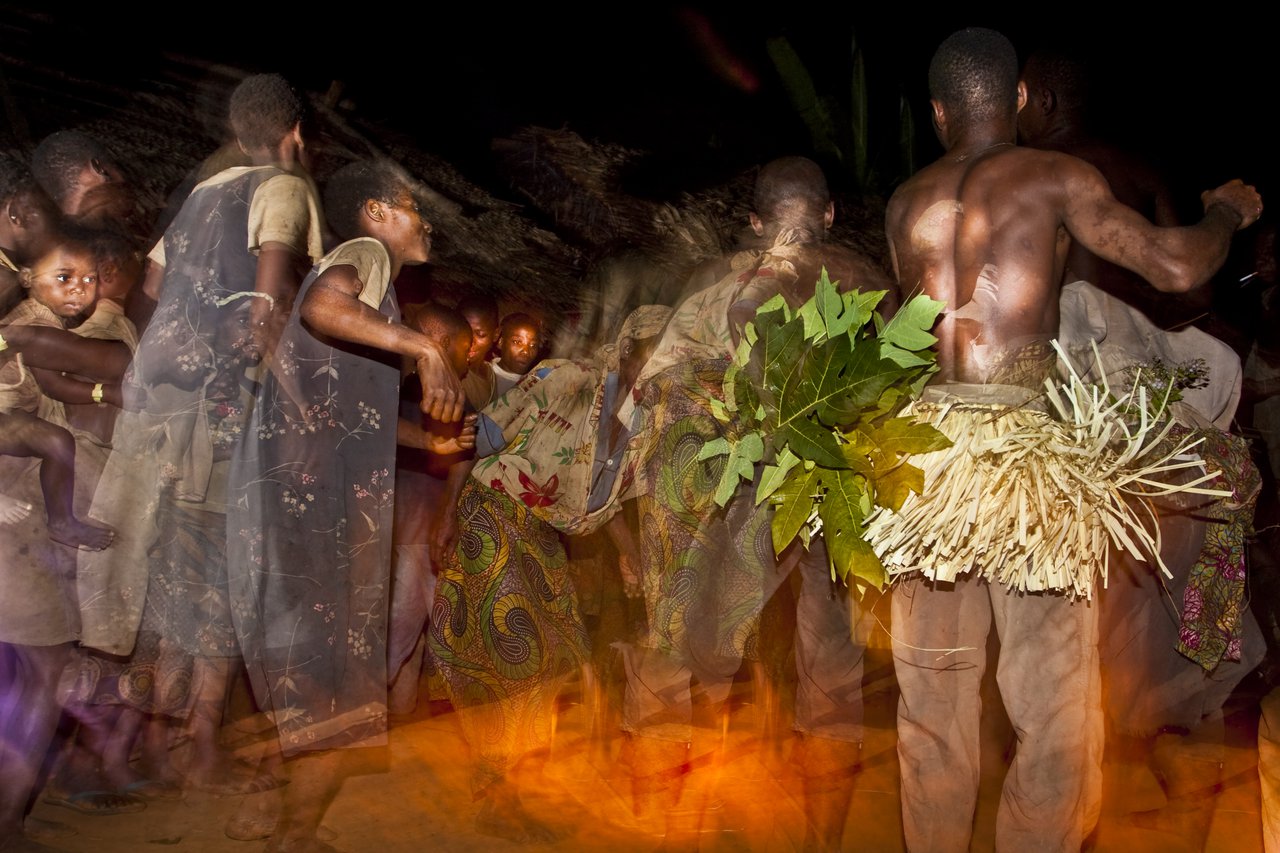
Indigenous people, such as Baka “pygmy” communities, are amongst those impacted by the spread of industrial rubber plantation in Central Africa. Guiseppe di Rocco via Getty Images.
The loss of land on which to farm, hunt and fish has started to create conflicts within communities according to villagers. Jean-Paul*, a chief from the village of Ndjikoum told us: “The battle for land is on.
“People are arguing over the scraps of land that are left for us.”
Local people even complained about a lack of drinking water. Wells were installed by Sudcam to replace water sources that had been swallowed up by the plantation. But these are insufficient and, in some cases, have failed to function properly, say some villagers.
Global Witness contacted Halcyon Agri – Sudcam’s main owner – prior to publication. It told us that it plans to provide 42 boreholes for the communities in the area, of which 13 are already operational, adding “last year, a borewell was constructed for the Bitye Baka [indigenous] community. Unfortunately, the initial borewell stopped working after 2 days. A new borewell was constructed soon after and has been in operation since.” The company said that they support two clinics and pay school fees for local Baka children. Its full response can be read here.
In Cote d’Ivoire, Africa’s biggest grower of rubber, protests by communities living next to one Belgian-owned rubber plantation have reportedly been met with violent repression by Ivorian authorities. When the Compagnie de Hévéicole Prikro (CHP) was granted rights to develop rubber plantations in 2013 it set in motion a land conflict with local villagers who said that they had not been consulted and decried the loss of farmlands and sacred forests. Protests eventually led to the deaths of four people at the hands of the police and imprisonment of 71 community members, according to human rights NGOs.
Ivorian activist Nahounou Daleba whose organisation Jeunes Volontaires pour l’Environnement (JVE) has worked closely with communities affected by the plantation said: “It’s a paradox. People in Europe driving fancy cars have no idea that the rubber in their tyres is grown in a place where the local population is almost destitute.”
The plantation is owned by Belgian multinational SIAT, which holds palm oil and rubber plantations across Africa. SIAT has publicly rebutted these reports and when contacted by Global Witness said that it “strongly condemns all forms of violence, including by law enforcement. Furthermore, this project [CHP] has been completely stopped.”.
A similar tale has reportedly unfolded at the Okomu rubber and palm oil plantation in Nigeria. The plantation is owned by Socfin, a firm with colonial roots that is controlled by colourful Belgian businessman Hubert Fabri – owner of “one of the world’s most revered private collections” of classic cars. In 2020, the company’s security forces were accused by a community leader of involvement in the burning down of a village inside the concession.
When contacted for comment by Global Witness, Socfin strongly denied reports about a village being burnt down, saying these were “unfounded” and that “no village has been burnt down by the company or any army at the company’s behest and no village named Ijaw-Gbene [the village named in reports] exists on [our] concession.”
Tension between the company and local communities near Okomu reportedly dates back years.
“A lot of community lands have been taken over,” according to Rita Uwaka, a researcher with Nigerian NGO Environmental Rights Action. “These lands were being utilized by farmers and fisherfolk … that depend on the resources of the forest for survival.”
Okomu’s plantations are located within a forest reserve that was established in 1912, and border a national park. Global Witness has mapped just under 4,130 hectares of deforestation within Okomu plantations apparently for rubber since 2000.
In a written response to Global Witness, Socfin told us that a lower figure of 3,486 hectares of ‘degraded’ forest was cleared at Okomu. In relation to tensions over land they said that “to protect the biodiversity and the environment Okomu prohibits fishing, farming, hunting, logging, and other activities within its concessions.” The company added that they run numerous corporate social responsibility programmes aimed at benefitting communities living near the concession. Socfin’s response can be read in full here.
Conflicts with local communities have also been reported in Socfin-controlled rubber plantations in Liberia and Cameroon.
A global trade
Data analysis by Global Witness strongly suggests that the EU’s most significant import from west and central Africa in terms of rainforest destruction, is natural rubber.
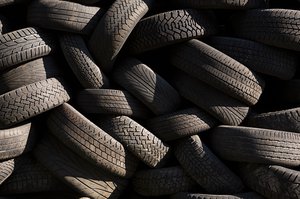
The EU imports as many as 150 million tyres annually, consuming a vast quantity of natural rubber. Shawn Waldron via Getty Images.
Rubber is an inescapable part of modern life, an essential part of products ranging from condoms to sports shoes. The commodity remained in strong demand through the Covid lockdowns as orders for medical latex gloves exploded. But the vast majority – around 70% - of natural rubber is used in vehicle tyres. While synthetic alternatives to rubber do exist, they lack the durability of natural rubber, meaning that the demand for land on which to plant rubber trees is unlikely to wane any time soon. The EU imported over 150 million car tyres in 2019. One study has suggested that 5% of the world’s natural rubber ends up in tyres in European vehicles. It would take almost 600,000 hectares of land to produce this amount of rubber each year.
In west and central Africa, rubber and palm oil are the two commodities most strongly associated with the conversion of rainforest lands to agriculture. Palm oil is included in the EU’s proposed deforestation regulation while rubber is not. But trade flows of rubber from the region to the EU dwarf those of palm oil, according to trade statistics analysed by Global Witness.
We looked at agricultural exports from forested countries in west and central Africa that have been particularly exposed to palm oil and rubber agribusiness investments in recent years – Gabon, Cameroon, Cote d’Ivoire, Ghana, Nigeria and Liberia – using the Observatory of Economic Complexity database. We found that in 2020 these countries shipped $503 million worth of natural rubber to the EU. This far outstripped EU imports of palm oil from the region, with palm oil imports from the same countries in 2020 totalling only $39 million. Palm oil, unlike rubber, is widely consumed within Africa and therefore is less export-driven than rubber.
The exclusion of rubber from the EU’s proposed deforestation law has been justified partly on the basis that Europe is only a small part of the international rubber consumer market for the commodity. But when it comes to the rubber trade specifically from Africa, the EU is the destination of a significant proportion of exports. The EU27 imported just under 32% of all rubber exported by the six African countries we looked at. The other main buyers of rubber from these African producers were Malaysia (29%) and China (15%). Malaysia is the world’s biggest producer of rubber gloves, and China the largest tyre exporter by value.
Bankrolling the rubber sector
The firms that run industrial rubber plantations in Africa rely on the EU market not only to sell their product, but also on European banks to finance their operations. Between 2016 and 2020, Olam made credit deals worth over $1 billion with the Netherlands’ Rabobank and $768 million with French banking giant BNP Paribas. UK banks – including HSBC and Barclays – made deals totalling over $3 billion with Olam during the same period.
Global Witness contacted these banks for comment. HSBC did not respond. BNP Paribas said that it cannot comment on individual clients but that “BNP Paribas does recognise the risk the rubber industry [poses] for forests.” It added that it has “pioneering policies in sectors which present potential risks to forests (agriculture, wood pulp, palm oil), covering in particular the deforestation issue. As a consequence, deforestation is regularly discussed with the Group’s customers and BNP Paribas monitors its clients’ commitments as well as their implementation.”
Rabobank told us that its thematic policies on biodiversity and land governance are "part of its engagement with clients in deforestation risk sectors, including rubber.”
Barclays said that, while unable to comment on individual clients, its approach to deforestation and the agriculture sector is outlined in its Forestry and Agricultural Commodities Statement. The bank said that in developing this policy they “focused initially on forestry, pulp & paper, palm oil and soy activities due to the relative significance of our exposure to clients in these sectors. We have less exposure to other deforestation-linked commodities. We are committed to enhancing our due diligence approach over time as our understanding of client-related deforestation risks and best practice guidance evolves.”
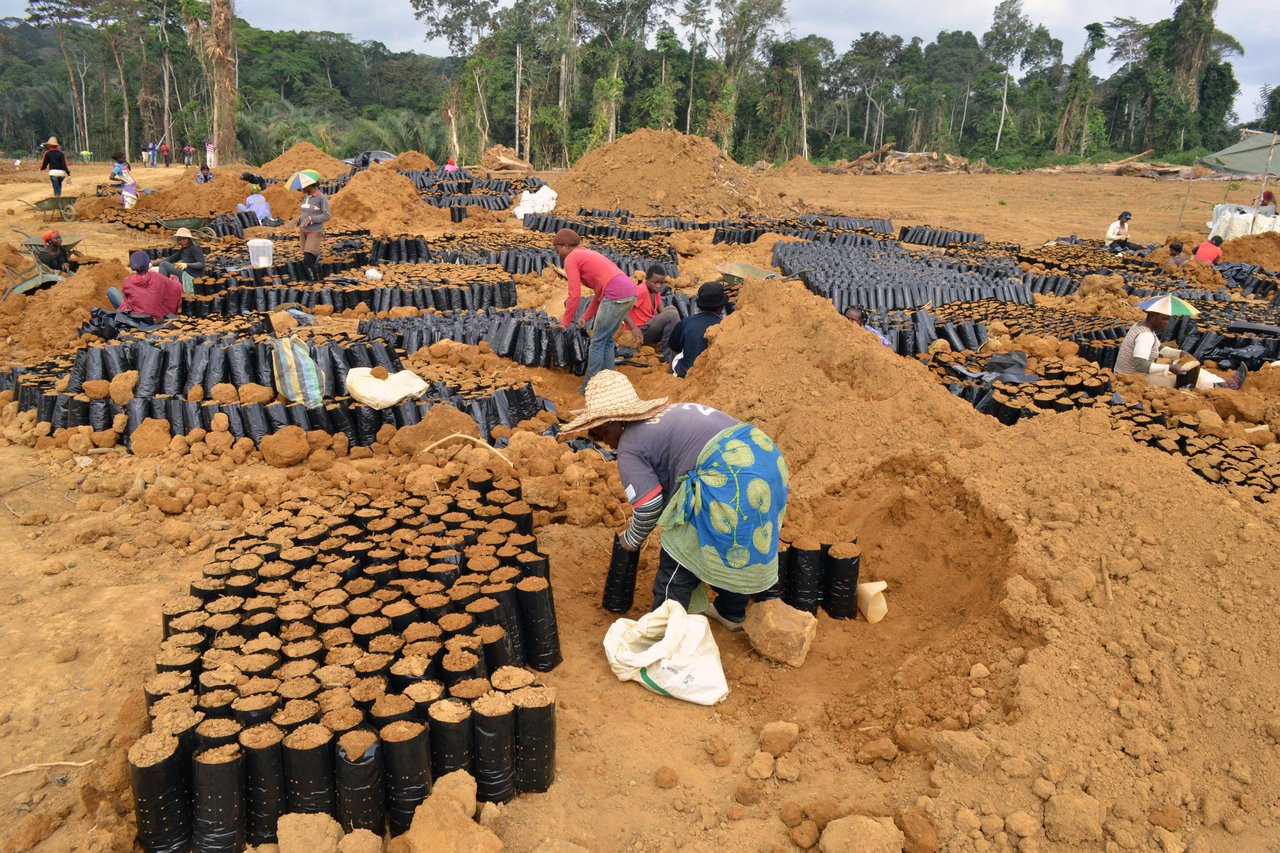
Worker plant seedlings at a plantation owned by Olam International in Gabon, 2013. AfrikImages Agency via Getty Images
In 2020, Halcyon Agri, the owner of Cameroon’s Sudcam plantations, struck a controversial ‘sustainability-linked’ loan worth up to $75 million with Deutsche Bank. Under the loan terms Halcyon Agri would benefit from a lower interest rate in return for meeting a set of sustainability benchmarks. These benchmarks addressed issues such as pollution, community engagement and transparency but did not include a plan to reverse the rainforest destruction that the company’s plantations are historically linked to, nor to address any alleged land-grabbing issues.
When contacted by Global Witness, a spokesperson for Deutsche Bank said that the loan was “very transparent,” as unlike most green loans the Key Performances Indicators (KPIs) are published and reported on regularly and publicly. The bank said that Halcyon Agri’s subsidiary also reported on its engagement with indigenous Baka communities living near the Sudcam plantation.
The approval of a green loan for rubber plantations linked to the razing of large swathes of rainforest alarmed many. Greenpeace called on Deutsche Bank to cancel the loan, a spokesperson saying, “dressing up its loan as sustainable is a textbook case of greenwashing”.
Conclusion
Until current legislative plans on deforestation are updated to include rubber, EU and UK consumers will continue to unwittingly fuel the destruction of some of the world’s most climate critical forests.
This investigation demonstrates the human cost of deforestation, linked to plantations that supply and are financed by European manufacturers and banks.
By omitting rubber, currently legislative efforts are failing to halt one of Europe’s most devastating impacts on the world’s forests. It is not too late to change course.
* Names have been changed.
This report was amended on 21 June 2022 to take into account comments received from Michelin and Rabobank.
